IT’S TIME TO FIX THE HOLE IN THE BUSINESS CASE FOR CLIMATE CHANGE.
3 March 2023
By Anthony Garnaut
This is a transcript of the presentation Anthony gave at the 2023 Sustainability Leaders Summit.
This summit is a voluntary gathering of people. We have assembled to discuss how the actions of the companies that we represent can help fix the many problems of the world, especially climate change. No one has compelled us to be here, as far as I’m aware.
I’m talking today about voluntary action and mandatory targets. My argument is that voluntary action has been remarkably successful recently at kick-starting positive change, but to finish the job we need our government to mandate further action.
I’d like to acknowledge the Traditional Custodians of this eel swamp on which we meet today, and pay my respects to their Elders past, present and future.
Serious change in my industry started out with voluntary action.
I run a business called ZEN Energy. We are a renewable electricity retailer – we buy energy from solar and wind farms, and sell that energy to customers through long-term, fixed price retail contracts.
Our business is committed to a 1.5 degrees Business Ambition under the Science Based Targets initiative. This makes us part of a group of 25 Australian companies who have done so, and we are the only energy company in this little group of 25.
I don’t understand why there are so few of us, as it seems to make good business sense. Most European energy companies signed up to 1.5 degrees around the time of the Paris Agreement. Of these, the company that moved the fastest towards 1.5 degrees, Iberdrola, has reduced its emissions intensity by three quarters just in the past eight years, while doubling its net profit and doubling its share price. One of the more reluctant European energy utilities, who didn’t sign up to 1.5 degrees, was bailed out by the German government last year at a cost of 50 billion euros.
Something similar, though on a less grand scale, has happened in Australia. Our first five years as a licenced retailer came with steady growth in employee engagement, customer numbers and profitability. Our industry peers who choose to hang on to their coal generators and not accept the climate science, have watched all their business metrics head sharply south over the same period.
Our employee engagement score last year was 20 points clear of the industry average, and in the first half of this financial year we were more profitable than Origin’s electricity business, one of few owners of coal generators who reported a profit.
So, what do we have to do to live up to a 1.5 degrees Business Ambition? I take it to mean that we need to do everything we can to limit carbon emissions, while running a successful business.
According to the Science Based Targets initiative, it means that we need to reduce our scope 1, 2 and 3 emissions in line with our industry’s fair share of the global effort to limit climate change to 1.5 degrees. And practically, it means we can only sign-up customers who commit to buy 100% renewable electricity.
The business got going in its current form in 2014, when my father Ross, whose book some of you have in front of you now, bought into an Adelaide-based solar hardware business called ZEN Energy With the existing shareholders, he set ZEN on a path to become a new energy utility.
As many of you may recall, 2014 was a depressing year for climate action in Australia, and also for my father. The carbon legislation that he had contributed to over the previous decade was repealed by the Abbott government, and the incumbent electricity retailers made hay. In South Australia, at the fringe of the national electricity grid, customers found themselves forced to pay more for less service. Overgrazing of the commons took the South Australian electricity market to the brink of collapse.
In those dark times (I’m not exaggerating, there was a blackout), a lot of conversations got going. Many voluntary assemblies were formed involving major energy users, politicians, and new energy businesses such as ZEN. We didn’t know at that stage what a new energy business was, or what one was meant to do. But we joined in the conversations to see where we this might lead us.
We helped start a conversation at the South Australian Chamber of Mines and Energy, whose members formed Australia’s first ACCC-approved electricity buying group and ended up signing up with ZEN to an 8-year electricity contract that was linked to a new solar project. The contract was set at a fixed price – the cost of solar plus a firming margin – which leaves this group of customers paying about half as much for their electricity today as they would do if they entered into a standard short-term electricity contract today.
We also helped start a conversation about grid reliability. This led on to a tender process run by the South Australian government to build the world’s biggest battery. That conversation has continued to evolve – some of you may not be aware that the new biggest battery in the world is 8 times bigger than South Australia’s Big Battery, and is being built in the Hunter Valley by an Australian company that is less than two years old.
Here’s one more example of voluntary conversations leading to serious change in the electricity market.
In January 2020, the chairman of Blackrock, the world’s biggest investment fund, wrote in his annual letter that the single greatest long-term investment risk was climate change. If he had waited a month before posting the letter, he might have replaced the phrase “climate change” with “pandemics”. But he didn’t, he called out climate change, and now every Board in the world has been forced to take the topic seriously.
After the Boards of the world had digested the letter, they realised that if they did not commit to a net zero strategy (which for starters means not opening up any new coal mines or oil and gas fields), they would not have any institutional investors on their share register.
It’s a big deal for a public company to be deprived of institutional investors. It doesn’t restrict all forms of capitalist enterprise – the Koch brothers, some hedge funds and Russian state-owned firms don’t need to care about what Blackrock’s chairman might think, but it does have a tangible impact on most listed companies. The belated efforts of AGL and Origin over the past couple of years to get on board with a net zero strategy come out of a recognition that if they failed to do so, they would lose access to capital markets.
We saw the full impact of the Blackrock letter in 2021, when global energy demand picked up after the COVID lull. The price of oil went up, but for the first time in seventy years, expenditure on oil and gas exploration failed to lift in response. This was because the net zero commitments of the oil and gas companies made it hard for them to ramp up their exploration and production spend.
So, a spike in demand for oil led to a spike in the price of oil, but this wasn’t followed by a spike in new supply. A market where supply doesn’t follow demand is a broken market.
The fossil fuel market, which is the world’s biggest commodity market, is now fundamentally broken. It was broken by the voluntary action of individual companies, who were responding to the guidance of fund managers such as Blackrock, who were responding to the agitation of NGOs such as The Sunrise Project, who drew out the contradiction between Blackrock owning 5% of the world’s equities and Blackrock not owning up to being responsible for 5% of the world’s carbon emissions.
NGOs such as the Sunrise Project, in turn, were responding to the conversations between high school students about how it wasn’t fair for the adults to trash the planet and leave the kids to clean up the mess. So, if we strip it down to the basics, it was the voluntary action of high school students that broke the world’s biggest commodity market.
Voluntary action is great, and those who take voluntary action early often stand to benefit from being an early mover, but voluntary action doesn’t get us all the way to where we need to go.
The Federal election in March last year announced the end of the climate wars. Labor won, with a policy platform that included credible targets for reducing Australian emissions of greenhouse gases – not just net zero by 2050, but also a 43% reduction by 2030.
The latter translates to the Australian electricity sector being 82% renewable by 2030, and 82% renewable makes for quite a challenge. It requires us to install twice as much wind and solar capacity across the country than was built in the last 15 years, and in half the time.
The challenge here is not really about supply chains, and it’s not really about capital. I’m not one to dismiss supply chain problems out of hand, but we only actually need a single crane crew working at the level of international best practice to erect the necessary number of wind turbines. And the amount of capital required is tiny in the scheme of things – $50b of equity investment would do the whole job, which is just 1.5% of what Australian’s hold in their super accounts, or what the Commonwealth government pays out in tax breaks on super funds accounts over $3m.
The main challenge to get to 82% renewable is that the business case to invest in renewables is weak.
Since the government intervention in the coal and gas market, the average spot price for electricity has been low, and the price for solar and wind has been lower – solar in South Australia achieved an average of about $20 per megawatt hour over the last three months. If we add the value of renewable certificate, we get to about the level of revenue required for an infrastructure asset to meet its hurdle return. And if a solar farm is only just meeting its investment hurdle today, how much revenue will it be getting in five years’ time, as more solar farms come into the market, or after 2030 when the market for renewable certificates is legislated to end?
There’s a simple solution here, which is to embrace mandatory targets. Don’t shut down the market for renewable certificates and ramp up the Renewable Energy Target to 82% by 2030. The business case then stacks up, technology and capital get to work, and we get to 43% by 2030, or thereabouts.
This topic is being debated in Canberra this month – while the crossbench in Parliament considers whether to support Labor’s Safeguard Mechanism, I’m hoping the settings for the Renewable Energy Target will also be discussed.
Voluntary actions by Coles and Woolworths and many other companies represented in this room today have effectively extended the scope of the Renewable Energy Target beyond its original design life. Voluntary action has been the main driver of investment in renewable projects over the past five years. But to hit our collective climate goals, to get to 82% renewable by 2030, we need to share the burden of responsibility more broadly, by leaning more heavily on mandatory targets.
The theme here is that voluntary action is great and has been the main driver of climate action to date. But it won’t get us all the way to where we want to go.
I’d like to end with a poem from an up and coming, neuro diverse hip hop artist who many of us have come to love this summer. Let’s hear it for Karen from ChatGPT:
Serious change begins with voluntary choice, But mandatory targets lend a stronger voice, We need both to create lasting change,
To build a better world, one that won’t be strange.
I’m not sure about that last rhyme, Karen doesn’t always nail it, but I’m happy to put up with one bad rhyme here and there if that’s the price we have to pay to embrace change.
Thank you.
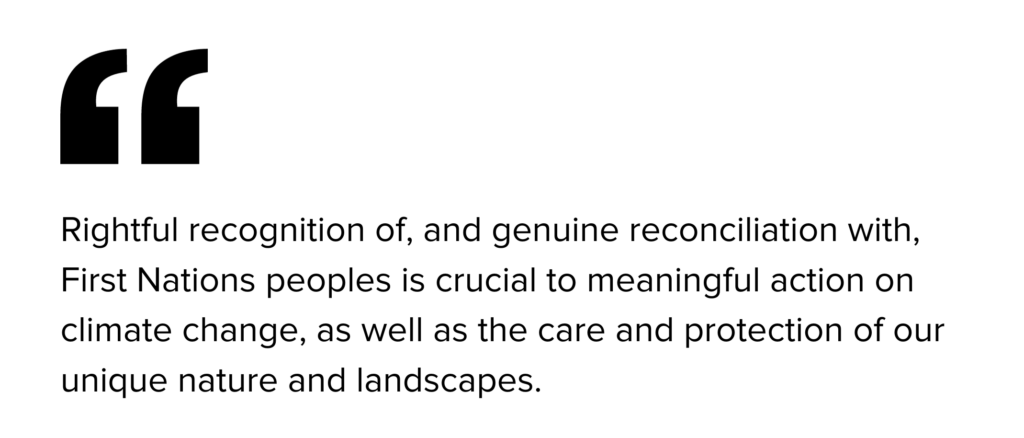
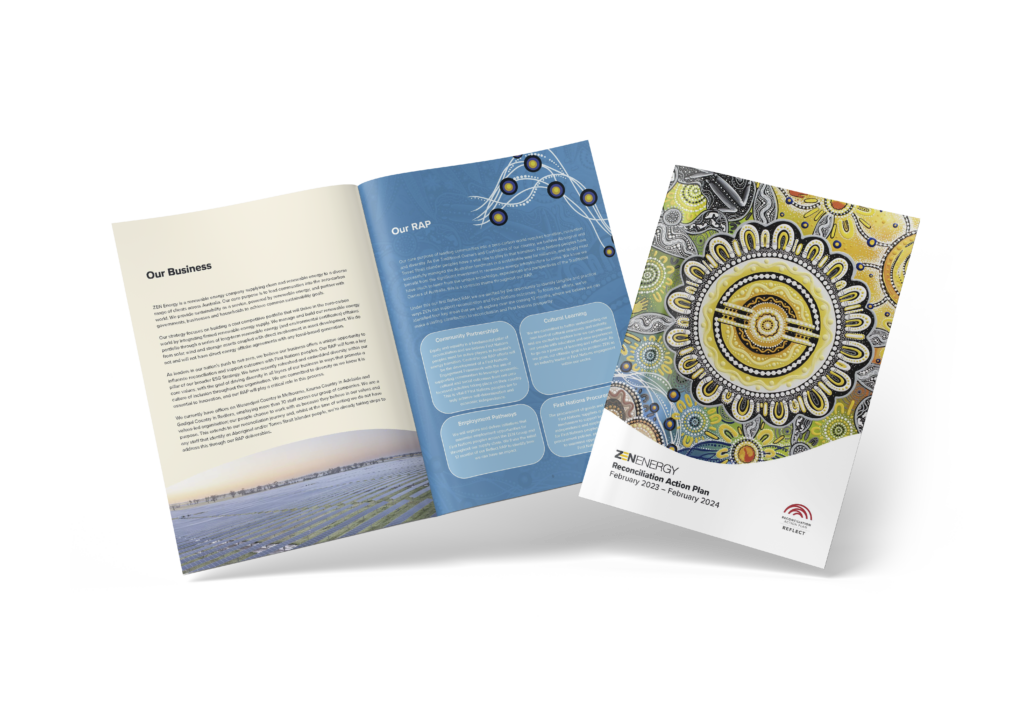






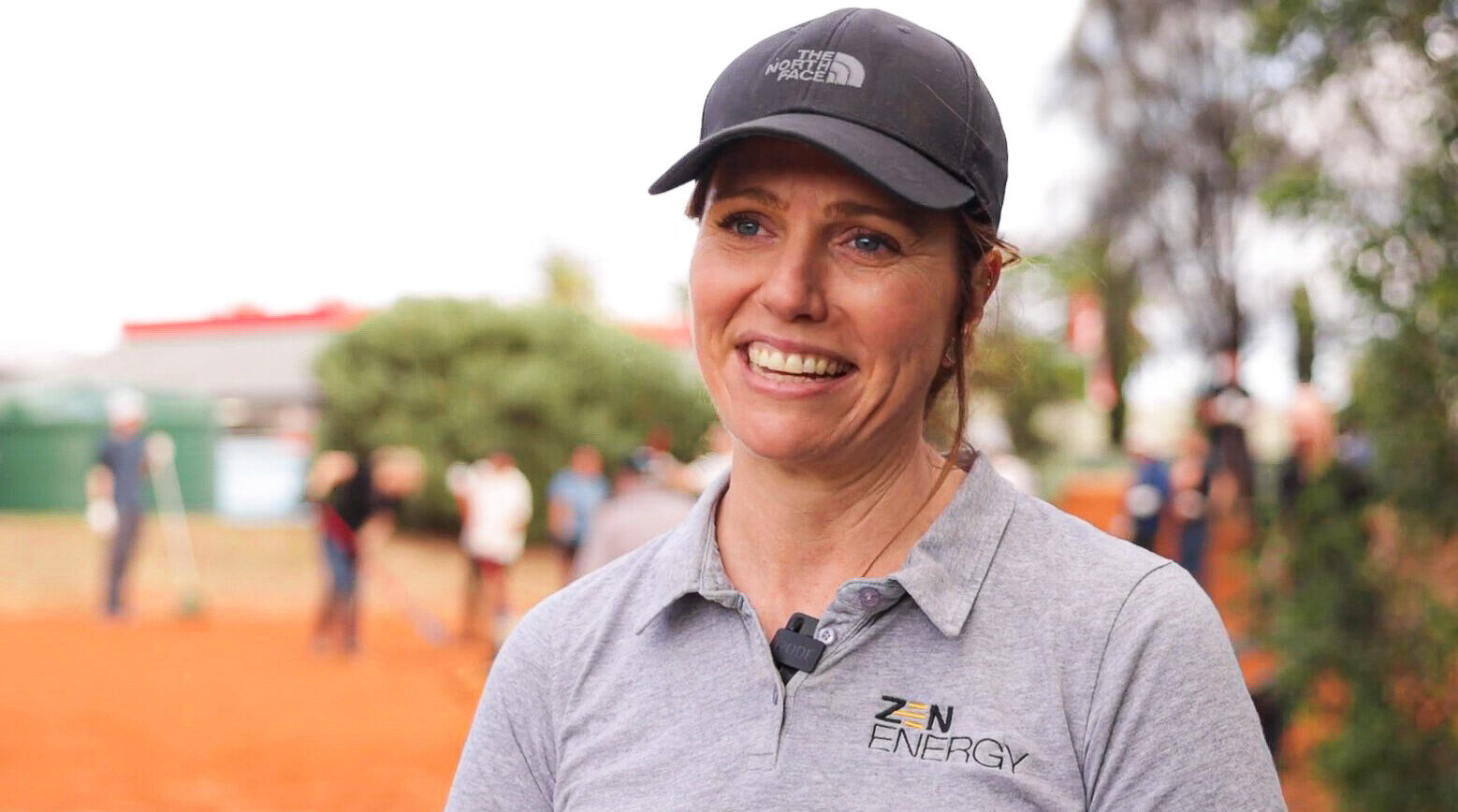

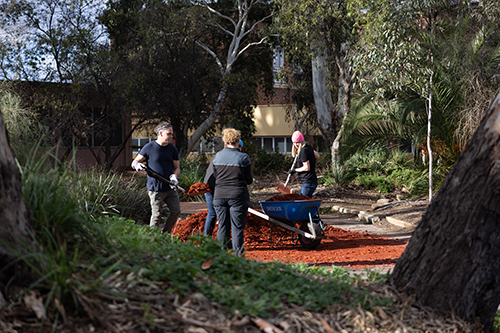
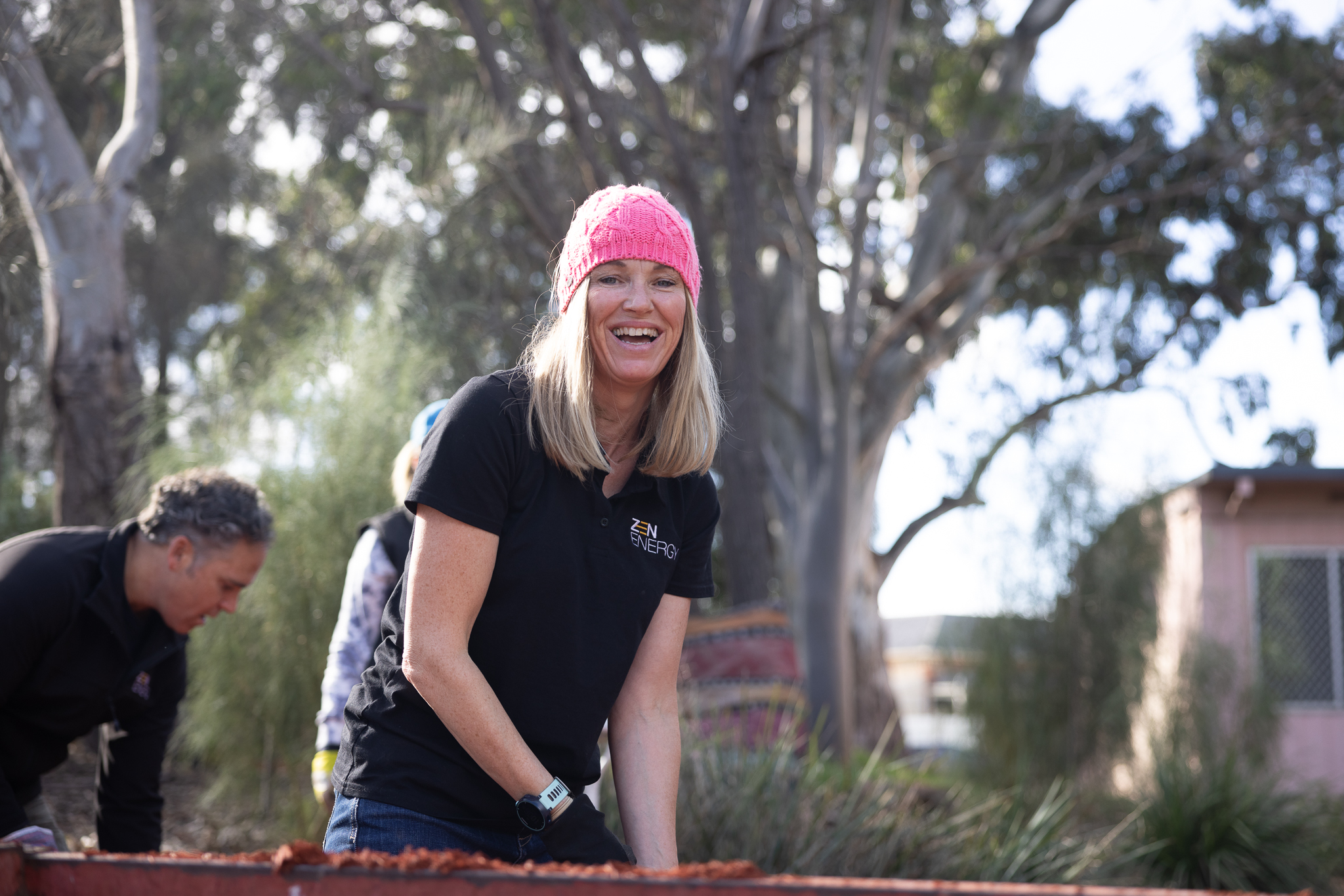
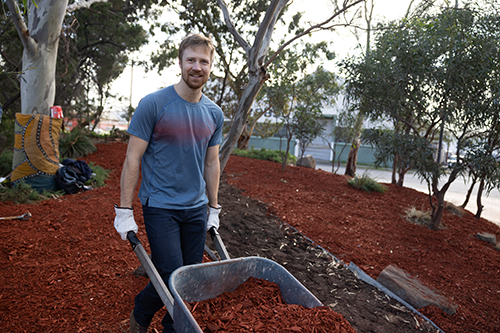
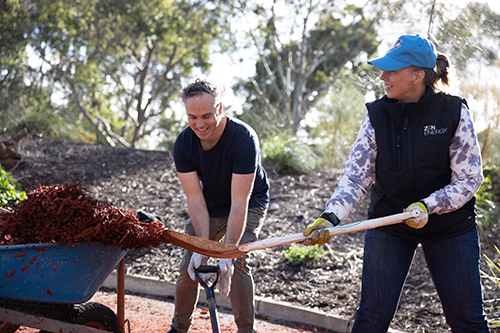
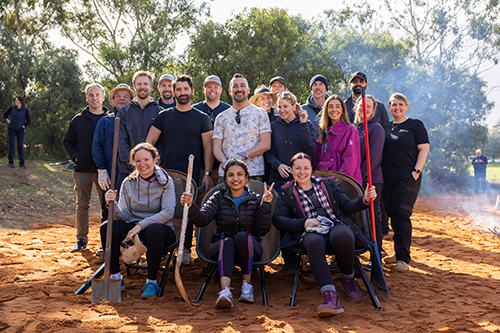
 Templers Battery Project in South Australia.
Templers Battery Project in South Australia.